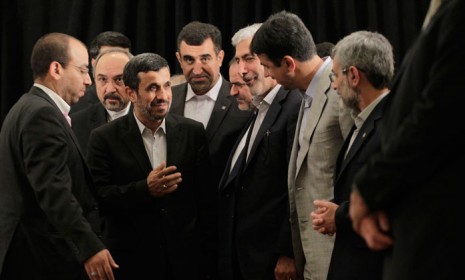3 reasons Tehran's mullahs may want Iran to get attacked
Iranian leaders are refusing to curb their nuclear program despite punishing sanctions and the threat of war. Do they want a fight?

A free daily email with the biggest news stories of the day – and the best features from TheWeek.com
You are now subscribed
Your newsletter sign-up was successful
Iranian President Mahmoud Ahmadinejad claims that Israel is bluffing when it threatens to bomb Iran's nuclear sites to stop Tehran from building its first atomic bomb. Iran insists its nuclear program is peaceful, focused on generating power to boost its economy. Still, Israel warns that in six or seven months, the Islamic Republic could have the know-how and fuel it needs to start building nuclear weapons. President Obama says the U.S. will "do what we must" to prevent Tehran from going nuclear, but he still wants to give diplomacy and sanctions more time. But perhaps Obama shouldn't hold his breath, Iranian human rights activist Shirin Ebadi tells Foreign Policy, because Iran's ruling mullahs actually are hoping that Israel will launch air strikes. Why would Tehran want to be attacked? Here, three theories:
1. To renew internal support for an unpopular regime
Iran's rulers are extremely unpopular with their own people, Ebadi tells Foreign Policy. The economy is crumbling, in part due to sanctions over Iran's refusal to rein in its nuclear program and in part because of government mismanagement. People are growing angry. But an attack from abroad "will stir nationalistic feelings and rally the people behind the government to defend the country." A war would devastate Iran's already suffering population, and it would further destabilize the already violence-prone Middle East. "But it will save Iran's rulers."
The Week
Escape your echo chamber. Get the facts behind the news, plus analysis from multiple perspectives.

Sign up for The Week's Free Newsletters
From our morning news briefing to a weekly Good News Newsletter, get the best of The Week delivered directly to your inbox.
From our morning news briefing to a weekly Good News Newsletter, get the best of The Week delivered directly to your inbox.
2. To distract Iran's neighbors
Iran's Shiite Muslim leaders have plenty of enemies in the region, says Bill Keller at The New York Times. They try to counter that by pandering "aggressively to the Arab rank and file" with all kinds of "jihadi, anti-Semitic bluster," posing "as champions of the wide Islamic world" in support of the Palestinians and against Israeli occupation. "An attack on an Islamic state by Israel, or by Americans presumed to be serving Israel's interests," would make their case for them, overriding old religious and nationalistic divisions. It would make Iran a hero in the eyes of the Islamic masses and unsettle "those hostile Arab monarchs who give Iran an uneasy feeling of encirclement."
3. To make Israel and the U.S. look like the aggressors
"There are no good options for restraining Iran's nuclear ambitions," says the San Francisco Chronicle in an editorial. Letting the mullahs build a bomb would put Israel's future at risk and "destabilize an already shaky Mideast." Bombing Iran's nuclear sites, however, might hurt us as much, or more, than the mullahs. For one thing, there's no guarantee that air strikes could really wipe out the country's nuclear program, because labs are scattered all over the place, and many are buried safely underground. The real danger, though, is that it would be a "politically toxic" move that would make Israel and the U.S. look like the war-mad aggressors.
A free daily email with the biggest news stories of the day – and the best features from TheWeek.com